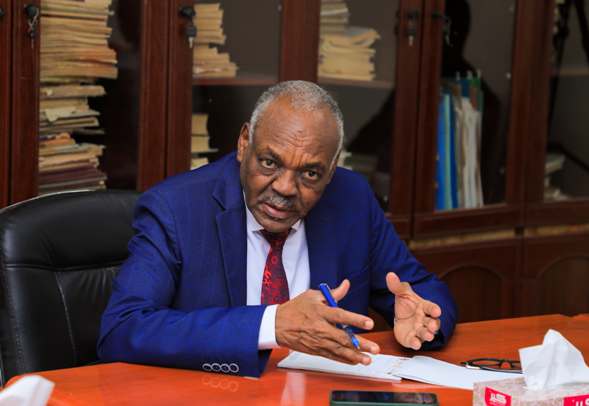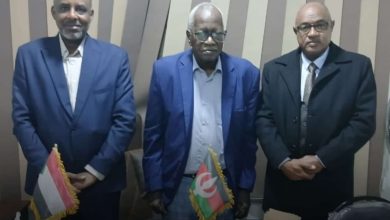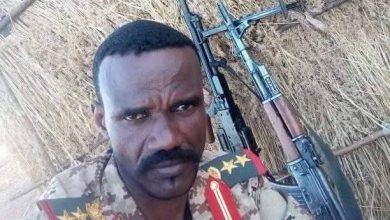Head of the Sudanese Government Delegation, Mohamed Bashir Abu Namo: “We do not want to confront America; we know our interests best

Abu Namo: “The war continues as long as the Rapid Support Forces’ aggression persists
Abu Namo: “The American envoy said in an informal meeting that the Jeddah Agreement has been overtaken by reality
Mohamed Bashir Abu Namo, the head of the Sudanese government’s negotiating delegation, stressed the government’s openness to any peace initiative, whether the current one mediated by Saudi Arabia and Washington or any other. He emphasized the importance of linking negotiations—at any time and place—to the outcomes of the Jeddah Agreement.
In a conversation with Al Jazeera Net, he explained that what happened in Geneva was not negotiations in the usual sense but rather “coordination to escape and create confusion, so people forget about the Jeddah platform and its signed commitments.” Abu Namo disclosed that the American envoy had stated plainly—in an unofficial meeting with Sudanese officials—that the Jeddah Agreement had been “overtaken by the new military reality on the ground,” indicating that the Rapid Support Forces had gained new territories.
He denied any government intention to confront Washington, affirming that the decision not to send their delegation to Geneva was to communicate that “no one in this world knows the interests of the Sudanese people better than they do themselves.”
Here’s the text of the interview:
What’s your perspective after the failed Geneva negotiations?
“First, what occurred in Geneva were not negotiations in the typical sense but coordination among the militia, the state behind it, and the American mediator. This was to escape from the Jeddah platform and create confusion so people would forget its commitments, aiming to circumvent their implementation and start new negotiations, claiming there is a new reality on the ground that has surpassed this platform.”
“For the record, the American envoy explicitly mentioned in Cairo in an unofficial meeting with Sudanese officials some time ago that the Jeddah Agreement had been overtaken by the new military reality on the ground, meaning the Rapid Support Forces had gained new territories, even though this acquisition itself is an additional breach of the Jeddah Agreement.”
“After the Geneva meeting, we are open to any peace initiative, whether the current one mediated by Saudi Arabia and the US or any other initiative, as long as any negotiation at any time and place is linked to the resolutions of the Jeddah Agreement. Once these are implemented, we can move forward. So, as I said, we are open and not apprehensive.”
“People should know there are always minimum and maximum fear limits in any major issue. The Sudanese people, in the past 16 months, have exceeded all maximum fear limits. The militia has been brutal—killing, torturing, forcibly displacing people from their homes, settling in these homes, bringing their families to live there, some from across the borders.”
“These houses were turned into military barracks, women were raped, some were taken as slaves to be sold for pleasure, and markets for slavery were established in some areas of western Sudan. Some girls were trafficked across borders to mercenary lands in West Africa.”
“The militia persisted in shelling cities it could not seize, like Al-Fashir, Al-Obeid, Babanousa, Sennar, and others, and looted livestock and crops from these cities, displacing their inhabitants en masse.”
“What then remains for the Sudanese people to fear when the platform originally intended to strengthen the militia by creating a type of truce to catch their breath and reorganize their supply lines to prolong the war?”
What is the fate of the Jeddah Agreement after negotiations shifted to Geneva?
“We do not see much importance in the geographical linkage. As a Sudanese government, if the parties (the conflicting sides, mediators, and observers) agree to change the platform for objective reasons, there’s no problem, and we can go to Geneva or any other city in the world, even Alaska, as Malik Agar, Vice President of the Sovereignty Council, said.”
“However, after our consultative meeting with the American envoy Tom Perriello in Jeddah, it was clear that the American mediator is seeking to achieve goals through changing the platform that has nothing to do with the peace of Sudan or expediting its achievement.”
What are those goals?
“Among these goals:
Dominating the decision-making in the upcoming negotiation phases by reducing the Saudi role and marginalizing it, convincing Jeddah to be content with the role of joint host with the Swiss government.
Inventing a new platform and attempting to impose new observers in it, claiming to bring more active partners who can pressure the Rapid Support Forces, which is unacceptable to us.
The Democratic Party, currently in power in the United States, is in the midst of its election campaign, hoping to score some electoral points by portraying that they have gathered the main conflict parties in Sudan on a new, vibrant platform, with the success of bringing some new (active) observers. Thus, they can depict that peace in Sudan is imminent at the hands of the Democrats, aiming to harvest some American votes in the upcoming elections about two months from now.”
Do you expect the mediators to compel the Rapid Support Forces to implement the Jeddah Declaration?
“The Jeddah Declaration came after significant effort by the mediators to bring the parties to it and have it signed convincingly by both sides with the witnesses of the mediators. Now the Americans hint at imposing sanctions only on the Sudanese government for not attending the Geneva meeting, which they did not consult us about.”
“Wouldn’t it be more appropriate to impose sanctions on a party that refused to implement what it had signed convincingly and in the presence of the mediators themselves? The double standards, lack of transparency, and imposition of will without a mandate are what cause the mediator to lose its neutrality, and unfortunately, Washington is heading down this path.”
“Some see that the government’s decision not to go to Geneva has put it ‘on the spot’ and led it into ‘trouble.’ What do you think?”
“The terms ‘on the spot’ and ‘trouble’ suggest that the Sudanese government has put itself in confrontation with Washington by not going to Geneva.”
“The Sudanese government knows its worth well and does not need to confront a superpower like the United States. However, anyone who reads between the lines of the strong statements by the head of the Sovereignty Council, Abdel Fattah al-Burhan, last Saturday with journalists in Port Sudan, will understand why the government did not send its delegation to Geneva.”
“Through the president’s statements, the government wanted to say, ‘No one in this world knows the interests of the Sudanese people better than they do themselves.’ I challenge anyone to come to me now and say, in any era of Sudan’s modern or ancient history, that the people have rallied around any government as they are rallying around the current government, not for any other reason but because it took a firm stance to rescue the country from invasion and division.”
“One last thing, history has shown that no country in the world has ever declared war on America, crossed the oceans, and gone to it, but it is always the one that involves itself in global conflicts, whether of its own making or that of others, often without an invitation from these countries or a UN Security Council mandate.”
“However, there are also live experiences where Washington—after getting involved in some conflicts—has packed its bags and left those countries voluntarily, with examples in Vietnam, Somalia, and Afghanistan. The superpower in this transient world does not always have the support of the highest heavenly power.”
“We do not want to engage in conflict with America at all, but at the same time, we hope it understands that we know our interests better than it and any other country, and we are indeed very eager to sit down with it because of its importance and discuss how to exchange interests as two sovereign states.”
“And I am not revealing a secret now when I say that I have submitted a personal written proposal (without a mandate from the government) to the American envoy as a serious project to initiate a Sudanese-American dialogue and sent it to him, preempting our expected meeting with him in Cairo, hoping to discuss this paper on the sidelines of our official meeting in a private session between us.”
“But he has not responded yet, perhaps he did not like the straightforward language of the letter that reflects the facts, although he—after that—briefed the head of the Sovereignty Council on the same proposal and praised it, saying it was worthy of attention, logical, and a good basis for dialogue with the Americans.”
Are there now any calls or initiatives presented to the Sudanese government after the failed Geneva negotiations, or are we facing a new military escalation and intensification of battles in the field?
“We have not seen any new initiatives yet, and perhaps it is still too early, but we are ready to consider any new initiatives that lead to ending the war. As for the war and the intensification of battles, they are unrelated to attempts to resume the Jeddah platform or find another, as the war continues as long as the militia’s aggression continues and its refusal to implement the signed resolutions of the Jeddah Agreement in May 2023.”
Will you lead the negotiating delegation in any upcoming negotiations?
“No one knows who will lead the negotiations in the next phase, as this is a decision for the government and will be taken at that time. However, the decision taken by the state leadership irrevocably is that any negotiation for peace in the future will include a representative delegation from the Sudanese government and not a military delegation as before.”
“What were the circumstances described by the American side as a breach of protocol on your part.



